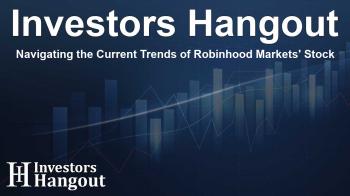Navigating the Current Trends of Robinhood Markets' Stock

The Current Landscape of Robinhood Markets Stock
Shares of Robinhood Markets Inc HOOD have shown stability lately amid tumultuous trading conditions. Recently, the stock achieved an all-time high, raising questions among investors about its future trajectory. Let's dive into the key factors shaping Robinhood's stock performance!
Understanding Recent Market Dynamics
Investor enthusiasm surged dramatically last week, prompted by several significant announcements from Robinhood. The company unveiled an aggressive strategy aimed at enhancing its presence in the cryptocurrency market. This strategy included plans to acquire a prominent crypto exchange and introduce commission-free tokenized U.S. equities and perpetual futures services for users in Europe.
Strategic Push into Cryptocurrencies
The CEO of Robinhood, Vlad Tenev, expressed that this transformative move aims to position cryptocurrency as a central component of the global financial ecosystem. Such ambitious initiatives are expected to foster long-term growth and encourage further innovation.
Analysts Weigh In
The expansive roadmap towards international growth prompted KeyBanc Capital Markets to upgrade its price target for Robinhood, nearly doubling it to $110. Analysts cited Robinhood's emphasis on unique innovations and its potential for market expansion as pivotal factors in this reassessment.
The firm's projections suggest a robust revenue increase, forecasting $3.77 billion and a GAAP EPS of $1.31 by 2025, which reflects significant growth from current figures.
Handling Stock Setbacks
However, not all news has been favorable. The recent performance of Robinhood stock was briefly affected when it was not included in the latest S&P 500 index reconstitution, a move many investors had anticipated. This unexpected exclusion caused a minor sell-off, injecting uncertainty among stakeholders.
Compounding the situation, warnings from major entities such as OpenAI raised eyebrows regarding Robinhood’s new "stock tokens." Following this, regulatory scrutiny has intensified, particularly from the lead authority in the EU, as they seek clarity on the legality and communication strategy regarding these financial instruments.
Market Sentiment and Analyst Ratings
The general sentiment among Wall Street analysts leans toward positivity for Robinhood despite the recent setbacks. Mizuho, for instance, reaffirmed its Outperform rating and increased its price target to $99, joining a chorus of analysts who have recognized Robinhood’s growth potential.
Contrastingly, not all analysts share this bullish outlook. In a more cautious approach, one firm downgraded the stock to a Sell rating with a conservative price target range of $40 to $48, highlighting a divide in investor sentiment.
Current Price Movements
As of the latest trading session, HOOD shares are experiencing a minor decline of approximately 1.19%, currently priced at $93.28. The stock continues to impress with a remarkable 52-week high of $100.88, juxtaposed with a 52-week low of $13.98, showcasing significant volatility in its trading journey.
Getting Started with HOOD Stock
If you're intrigued by the opportunity to engage with Robinhood Markets, whether through purchasing shares or exploring other trading strategies, you're in the right place. Investing in shares is typically accomplished via a brokerage account, and many platforms now offer options for buying fractional shares, allowing greater flexibility for investors.
At the current trading level of $94.44, an investment of $100 would allow you to acquire just over 1 share of HOOD stock. If you are considering alternative strategies, such as short selling, you may require access to specific trading platforms that facilitate these transactions.
Practical Steps for Investment
This could involve collaborating with brokers that offer options trading, positioning you to capitalize on stock price declines via methods like purchasing put options or selling call options. Regardless of your approach, there are numerous resources available to guide you through these investment strategies.
Frequently Asked Questions
1. What caused the recent rise in Robinhood stock?
The recent surge is attributed to announcements surrounding aggressive expansion into cryptocurrency, enhancing investor enthusiasm.
2. How do analysts feel about Robinhood's stock performance?
Wall Street sentiment is generally positive, with many analysts raising their price targets following the company's growth initiatives.
3. What challenges is Robinhood currently facing?
Robinhood faces regulatory scrutiny over its new stock tokens and a missed opportunity for inclusion in the S&P 500, impacting investor confidence.
4. How can investors buy shares of Robinhood?
Shares can be acquired through brokerage accounts, with many platforms offering fractional shares for greater accessibility.
5. What is the significance of Robinhood’s crypto strategy?
Robinhood’s strategy aims to position cryptocurrency as a foundational element of finance, tapping into a growing sector to foster further growth.
About The Author
Contact Henry Turner privately here. Or send an email with ATTN: Henry Turner as the subject to contact@investorshangout.com.
About Investors Hangout
Investors Hangout is a leading online stock forum for financial discussion and learning, offering a wide range of free tools and resources. It draws in traders of all levels, who exchange market knowledge, investigate trading tactics, and keep an eye on industry developments in real time. Featuring financial articles, stock message boards, quotes, charts, company profiles, and live news updates. Through cooperative learning and a wealth of informational resources, it helps users from novices creating their first portfolios to experts honing their techniques. Join Investors Hangout today: https://investorshangout.com/
The content of this article is based on factual, publicly available information and does not represent legal, financial, or investment advice. Investors Hangout does not offer financial advice, and the author is not a licensed financial advisor. Consult a qualified advisor before making any financial or investment decisions based on this article. This article should not be considered advice to purchase, sell, or hold any securities or other investments. If any of the material provided here is inaccurate, please contact us for corrections.

